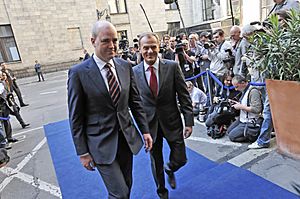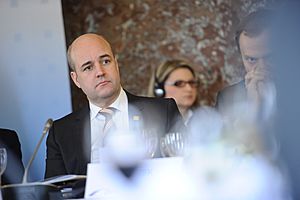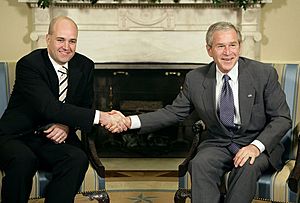Fredrik Reinfeldt facts for kids
Quick facts for kids
Fredrik Reinfeldt
|
|
|---|---|
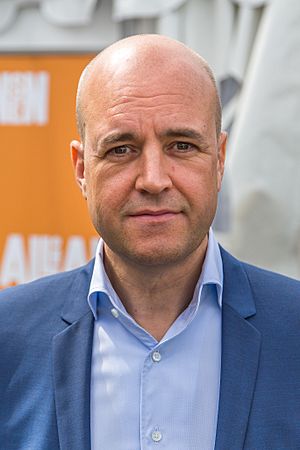
Reinfeldt in 2014
|
|
| Prime Minister of Sweden | |
| In office 6 October 2006 – 3 October 2014 |
|
| Monarch | Carl XVI Gustaf |
| Deputy | Maud Olofsson Jan Björklund |
| Preceded by | Göran Persson |
| Succeeded by | Stefan Löfven |
| Leader of the Opposition | |
| In office 3 October 2014 – 10 January 2015 |
|
| Monarch | Carl XVI Gustaf |
| Prime Minister | Stefan Löfven |
| Preceded by | Stefan Löfven |
| Succeeded by | Anna Kinberg Batra |
| In office 25 October 2003 – 6 October 2006 |
|
| Monarch | Carl XVI Gustaf |
| Prime Minister | Göran Persson |
| Preceded by | Bo Lundgren |
| Succeeded by | Göran Persson |
| Leader of the Moderate Party | |
| In office 25 October 2003 – 10 January 2015 |
|
| Deputy | Gunilla Carlsson |
| Preceded by | Bo Lundgren |
| Succeeded by | Anna Kinberg Batra |
| Member of the Riksdag for Stockholm County |
|
| In office 1991–2014 |
|
| Personal details | |
| Born |
John Fredrik Reinfeldt
4 August 1965 Haninge, Sweden |
| Political party | Moderate Party |
| Spouse | |
| Domestic partners | Roberta Alenius (2015–2022) |
| Children | 4 |
| Alma mater | Stockholm University |
| Cabinet | Reinfeldt's cabinet |
| Signature | |
| Military service | |
| Allegiance | Sweden |
| Branch/service | Swedish Army |
| Unit | Lapland Ranger Regiment |
John Fredrik Reinfeldt (born 4 August 1965) is a Swedish economist and lecturer. He served as the Prime Minister of Sweden from 2006 to 2014. He was also the leader of the Moderate Party, a political group, from 2003 to 2015. In 2009, he was the last rotating President of the European Council. More recently, he was the chairman of the Swedish Football Association from 2023 to 2025.
Reinfeldt grew up in Stockholm County. He joined the Moderate Youth League in 1983. By 1992, he became its chairman, a role he held until 1995. He was a member of the Swedish Parliament (the Riksdag) from 1991 to 2014. He became the leader of the Moderate Party in 2003. Under his leadership, the party changed its policies to be more central, calling themselves "The New Moderates." In 2010, the Moderate Party received its highest number of votes since 1921.
After the 2006 election, Reinfeldt became Prime Minister on 6 October. He led a government with three other center-right parties. At 41, he was one of Sweden's youngest prime ministers. His time as prime minister included the 2008 financial crisis. Despite initial challenges, Sweden's economy became very strong. This led to his government being re-elected in 2010. His leadership focused on helping more people find jobs.
He is the longest-serving non-Social Democratic Prime Minister since the late 1800s. After his party lost the 2014 election, Reinfeldt stepped down as party leader in 2015.
Contents
Early Life and Education
Fredrik Reinfeldt was born in Stockholm in 1965. He was the oldest of three brothers. His family lived in different parts of Stockholm County. His mother was a consultant, and her work might have inspired him.
When he was 11, Reinfeldt became the chairman of his school's student council. He also became a fan of the football club Djurgårdens IF. He played basketball for the "Tensta Tigers." In high school, he studied natural science. After school, Reinfeldt completed his military service as a ranger. He finished first in his class. During this time, he became interested in politics. He graduated from Stockholm University School of Business in 1990 with a degree in Business and Economics.
Political Journey
Reinfeldt joined the Moderate Youth League in 1983 when he was 18. He wanted the local youth league to focus more on political discussions. In 1988, he became a secretary in the Stockholm Municipality Council.
He was also active in student politics at Stockholm University. In 1991, he was elected to the Riksdag, the Swedish Parliament. The Moderate Party and its allies did well in the 1991 election. This led to a center-right government being formed.
Leading the Moderate Youth League
From 1992 to 1995, Reinfeldt was the chairman of the Moderate Youth League. He won a close election against the previous chairman, Ulf Kristersson. This election was important because it showed a difference in ideas within the youth league. Reinfeldt later said that this moment was key to his political career.
In 1993, Reinfeldt wrote a book called The Sleeping People. In this book, he shared his ideas about society and the welfare system. He also co-authored another book in 1995, which discussed leaders in the Moderate Party. After this, he was not given important roles in the party for a while. However, after a change in leadership in 1999, he became more involved. From 2001 to 2002, he led the justice committee in the Riksdag.
Becoming Moderate Party Leader
In the 2002 election, the Moderate Party had a low number of votes. Because of this, the party leader resigned. On 25 October 2003, Fredrik Reinfeldt was chosen as the new leader of the Moderate Party.
The New Moderates
Under Reinfeldt's leadership, the Moderate Party changed its approach. They moved closer to the center of politics. They started calling themselves "The New Moderates" to show this change. The party began to focus more on tax cuts for people with lower and middle incomes.
Reinfeldt also talked about reforming Sweden's welfare system. He suggested cutting taxes for low-income earners and reducing unemployment benefits. His goal was to help more people get jobs. He wanted to improve the welfare system rather than completely change it. He even invited the Swedish Trade Union Confederation, which usually supported other parties, to discussions.
Some people thought these changes were just new ways of talking about old ideas. Others believed it was a real shift in the party's policies. The differences between the Moderate Party and the Social Democrats became less clear.
Alliance for Sweden
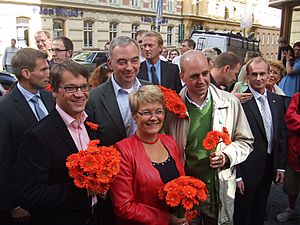
Before the 2006 election, Reinfeldt helped create the Alliance for Sweden. This group brought together four center-right parties: the Moderate Party, the Centre Party, the Liberal People's Party, and the Christian Democrats. Reinfeldt played a big part in uniting these parties. They presented a shared plan for the election.
2006 and 2010 General Elections
In the general election on 17 September 2006, the Alliance for Sweden won. They defeated the Social Democratic Party. The Moderates received a record number of votes for their party. This election was also historic because it was the worst result for the Social Democrats since 1921.
In the 2010 general election, held on 19 September 2010, the Alliance for Sweden won again. They became the first center-right government to be re-elected since before World War II. The Moderate Party got 30.06 percent of the votes, their highest result in over a hundred years. The Alliance had the most votes, but not a full majority in Parliament. However, because the opposition was divided, the government could continue.
Prime Minister (2006–2014)
Reinfeldt became the Prime Minister of Sweden on 6 October 2006. He was approved by the Riksdag and confirmed by King Carl XVI Gustaf. At 41, he was one of the youngest prime ministers in Sweden's history. He led the Moderate Party to two election victories in a row. His government included four parties that formed the Alliance for Sweden.
First Term (2006–2010)
Economic Challenges and Recovery
The 2008 financial crisis greatly affected Sweden's economy. Reinfeldt's government focused on having a balanced budget. They also cut income taxes to help businesses and encourage spending. At first, his policies were not very popular.
However, from 2009, Sweden's economy started to recover quickly. It became one of the strongest economies in the world. This success helped Reinfeldt gain more support. It led to his re-election in 2010. This was the first time the Moderate Party was re-elected after serving a full first term.
Leading the European Council
Reinfeldt became President of the European Council on 1 July 2009. This happened when Sweden took over the leadership of the Presidency of the Council of the European Union. His main goal was to encourage the European Union to do more to fight climate change. He also hoped that Turkey would join the European Union.
Second Term (2010–2014)
In the 2010 election, the Moderate Party increased its votes. The Alliance won the most votes, but did not have a full majority in parliament. This meant Reinfeldt's government had to work more closely with other parties to get things done.
During his second term, the economy slowly recovered. The government continued with policies from the first term. However, from 2013, the government faced challenges. These included concerns about Swedish students' performance in international tests and questions about private welfare services.
Immigration Policy
After the Sweden Democrats party entered the Riksdag, Reinfeldt wanted to find common ground on immigration policy. In 2011, an agreement was made between the Alliance and the Green Party. This agreement allowed undocumented immigrants to access healthcare and made it easier for families to reunite.
In the last year of his time in office, Sweden saw a large increase in immigrants. Before the 2014 election, Reinfeldt encouraged Swedes to "open their hearts" to people fleeing wars. He mentioned that immigration would bring costs.
Economic Approach
Reinfeldt followed a liberal economic plan. This included changing the tax system, removing inheritance tax, and making it harder to get unemployment or sick benefits. These changes aimed to reduce public spending.
From 2006, his government privatized much of the health sector. This led to more specialists and shorter waiting times. However, it also increased costs for the government and led to some differences in access to healthcare. In 2013, The Economist magazine praised Reinfeldt's reforms, suggesting Sweden could become a "liberal supermodel."
Foreign Relations
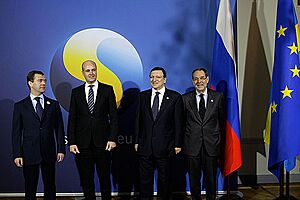
The Moderate Party supports the European Union and Sweden joining NATO. Reinfeldt visited the United States in 2007, meeting with President George W. Bush. They discussed climate change and free trade. He also met with President Barack Obama in 2009.
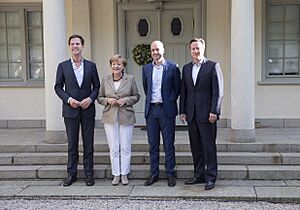
As President of the European Council in 2009, Reinfeldt oversaw the signing of the Treaty of Lisbon. He also worked to get a strong agreement on climate change at a United Nations conference, though this was not fully successful.
After Being Prime Minister (2014–Present)
After his party lost the 2014 election, Reinfeldt announced he would step down as Prime Minister and party leader. He left the Prime Minister's office on 3 October 2014. He also resigned from the Riksdag at the end of 2014 and stepped down as party leader in January 2015.
In January 2015, Reinfeldt started his own business, Fredrik Reinfeldt AB. He works as an advisor and lecturer. In September 2015, he published his autobiography called Halfway, which looks back at his 25 years in politics.
In December 2015, he was nominated to lead the Extractive Industries Transparency Initiative. In March 2016, he was hired by Bank of America Merrill Lynch as a senior advisor. On 25 March 2023, he was elected chairman of the Swedish Football Association. Simon Åström replaced him as chairman on 22 March 2025.
Public Opinion
Reinfeldt has been compared to David Cameron because he helped shift the Moderate Party to a more central position. He is seen as a calm and thoughtful person. People described him as "gentle, pensive, and a good listener." This calm approach was popular with Swedish voters. He also presented his policies as practical and based on common sense.
In 2006, a Swedish polling group called Sifo found that Reinfeldt was the "most admired man in Sweden." His approval rating reached 57% in December 2006. His personal approval remained good, even if support for his government changed.
Personal Life
In 1992, Fredrik Reinfeldt married Filippa Holmberg. She was also a politician for the Moderate Party in Stockholm County. They had three children: Ebba, Gustaf, and Erik. After becoming Prime Minister in 2006, Reinfeldt and his family moved into the official residence, the Sager House. In 2012, the couple separated and later divorced in 2013.
In 2015, Reinfeldt confirmed he was in a relationship with Roberta Alenius. She had worked as his Head of Communications when he was Prime Minister. In 2017, Alenius gave birth to Reinfeldt's fourth child. The couple announced their separation in 2022.
It is known that Reinfeldt has diverse family roots. His great-great-grandfather was an African American circus director from New York. He also has Italian ancestry.
Reinfeldt has mentioned that his personal dislike for the anti-immigration Sweden Democrats party is partly due to his African ancestry. He left the Church of Sweden when he was 18. As Prime Minister, he said he was unsure if he believed in God, but felt "something exists that is not just about the scientific explanation." He had his children baptized in the Church of Sweden.
Honours
National Honours

 Recipient of the King Carl XVI Gustaf's Jubilee Commemorative Medal II (23 August 2013)
Recipient of the King Carl XVI Gustaf's Jubilee Commemorative Medal II (23 August 2013)
 H. M. The King's Medal, 12th size with chain (4 February 2016)
H. M. The King's Medal, 12th size with chain (4 February 2016)
Foreign Honours

 Estonia: Order of the Cross of Terra Mariana, 1st Class (18 January 2011)
Estonia: Order of the Cross of Terra Mariana, 1st Class (18 January 2011)
Images for kids
See also
 In Spanish: Fredrik Reinfeldt para niños
In Spanish: Fredrik Reinfeldt para niños
 | James B. Knighten |
 | Azellia White |
 | Willa Brown |


